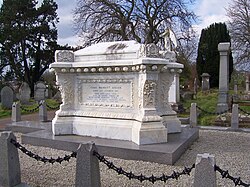Mortimer Singer

Sir Adam Mortimer Singer, KBE, JP (25 July 1863 – 24 June 1929) was an Anglo-American landowner, philanthropist, and sportsman, who was one of the earliest pilots in both France and the United Kingdom.
Childhood and family
Singer was born in 1863 in Yonkers, New York, to Isaac Singer, the founder of the Singer Sewing Machine Company, and his wife Isabella Eugénie Boyer, a French model. He was the couple's first child, though Isaac had at least eighteen children by a number of previous wives and mistresses. Shortly after Mortimer's birth, his parents moved from New York to Paris, and then, following the outbreak of the Franco-Prussian War in 1870, to Oldway Mansion in Devon, England.
His father died in 1875 and the children, with their mother, inherited substantial wealth. Adam was the eldest of Isabella's children; he had three brothers and two sisters. Of these, his sister Winnaretta married into French nobility and became a patron of the arts, while his brother Washington was a philanthropist and racehorse owner. Singer matriculated at Downing College, Cambridge, in October 1881;[1] his youngest brother, Eugene, would later study at the same college.[2] He left the university without taking a degree. While originally born an American citizen, he naturalised as a British subject in 1900.[1]
Later life
Singer's first passion was thoroughbred horses, which he began breeding and racing in 1881. He was also a keen sportsman and a pioneer in the early development of cycling, driving, and flying in Europe.[3] In January 1910, aged 46, he became the twenty-fourth person in France to hold a pilot's certificate from the Aéro-Club de France, and May the eighth person in the United Kingdom to hold one from the Royal Aero Club.[4]
In the following years, he offered a series of awards for the development of British aviation, including a £500 bounty for the first practical British-built amphibious aircraft, won by the Sopwith Bat Boat in 1913.[5]
Singer later adopted the lifestyle of the traditional landed gentry, acquiring a country estate at Milton Hill, near Steventon, Berkshire, and an apartment in central Mayfair.[1] Two days after the outbreak of the First World War he offered the recently rebuilt house at Milton Hill as a military hospital for soldiers and NCOs; it grew to a 220-bed facility, the largest of the privately run wartime hospitals, and treated over 4,500 men. Until the 1918 influenza pandemic, it had only had one death among its patients. Singer and his brother Washington underwrote the entire operating costs of the hospital, and Singer worked throughout the war as its chief administrator. His wife worked as matron-in-chief, and was actively engaged in nursing and massage.[6]
After the war, Singer became a Justice of the Peace, was made a Knight Commander of the Order of the British Empire,[1] and in 1921 he served as the High Sheriff of Berkshire.[7] He died in June 1929, leaving an estate of almost £500,000.[8]
References
- ^ a b c d "Singer, Adam Mortimer (SNGR881AM)". A Cambridge Alumni Database. University of Cambridge.
- ^ "Singer, Eugene Paris (SNGR885EP)". A Cambridge Alumni Database. University of Cambridge.
- ^ SINGER, Sir Mortimer, Who Was Who
- ^ Mortimer Singer profile, aviatechno.free.fr; accessed 22 June 2014. Template:Fr icon
- ^ Flight (magazine), 12 July 1913, pg. 762.
- ^ "Milton Hill Section Hospital", North Berks Herald, 1 February 1919. Copy at aaahs.org.uk; accessed 24 June 2014.
- ^ "No. 32254". The London Gazette. 11 March 1921. p. 1994.
- ^ National Probate Calendar (Index of Wills and Administrations), 1858-1966.
